

17-26 jlt 2021 Un médicament toxique menace la survie des vautours en France. Vallée d’Ossau (Pyrénées-Atlantiques), reportage En cette matinée d’été, le soleil éclabousse de lumière la petite vallée d’Ossau, dans les Pyrénées-Atlantiques.
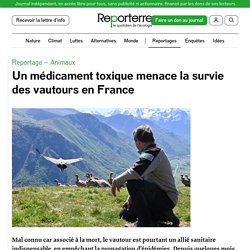
Il faut plisser les yeux pour apercevoir les grands vautours fauves (Gyps fulvus) et le percnoptère (Neophron percnopterus) qui ont décollé de leur falaise dès les premiers rayons, et planent à la recherche de cadavres d’animaux à dévorer. Ce qui préoccupe en effet ce passionné, c’est une alerte d’Olivier Duriez, l’un des consultants scientifiques du parc, reçue en mai dernier. Ornithologue, spécialiste des vautours et maître de conférences à l’université de Montpellier en écologie fonctionnelle et évolutive, il intervient également en tant que scientifique auprès de la Ligue pour la protection des oiseaux (LPO), au sein de la Mission Rapaces, mais aussi auprès des grands parcs nationaux. Un groupe de vautours fauves dans leur environnement naturel, dans la vallée d’Ossau Un cas d’intoxication qui préoccupe. Pour la sauvegarde des soins traditionnels dans les élevages ! A l'attention du ministre de l'Agriculture, Didier Guillaume Le règlement européen UE 230-2013 a imposé le retrait de plus de 600 plantes sous forme d’extraits végétaux ou d’huiles essentielles pour les animaux.
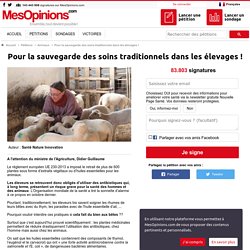
Les éleveurs se retrouvent donc obligés d’utiliser des antibiotiques qui, à long terme, présentent un risque grave pour la santé des hommes et des animaux. L’Organisation mondiale de la santé a tiré la sonnette d’alarme à ce propos en octobre dernier. Pourtant, traditionnellement, les éleveurs bio savent soigner les rhumes de leurs bêtes avec du thym, les parasites avec de l’huile essentielle d’ail, ... Pourquoi vouloir interdire ces pratiques si cela fait du bien aux bêtes ?? Surtout que c’est aujourd’hui prouvé scientifiquement : les plantes médicinales permettent de réduire drastiquement l’utilisation des antibiotiques, chez l’homme mais aussi chez les animaux. Utiliser les vertus des plantes dans les élevages ne devrait pas être interdit.
Ils ignorent les alternatives naturelles. Protection des soins traditionnels dans les élevages. Sandrine Lizaga est éleveuse bio en Provence.

Elle soigne ses 60 brebis aux huiles essentielles et à l’homéopathie. Sauf cas extrêmes (tous les quatre ans environ), Sandrine n’utilise jamais d’antibiotiques pour ses animaux. Mais sa démarche ne plaît pas à tout le monde. Le 6 août 2013, elle reçoit la visite surprise de deux inspectrices de la DDPP (Direction départementale de la protection des populations) : « À la vue de mes produits, elles se sont littéralement décomposées, raconte Sandrine.
Les inspectrices expliquent alors à Sandrine qu’elle n’a pas le droit de prescrire elle-même des traitements. Si elle n’obtempère pas, elle risque d’être privée des aides de la politique agricole commune (PAC). 15 000 euros sont en jeu. L’affaire fait la une de la presse locale et paraît même au niveau national. Sandrine est abasourdie. Are Antibiotics Nearly Obsolete? CIWF France. Europe Reaches 'Breakthrough' Agreement In Fight Against Antibiotic Resistance. European leaders of the G20 have just reached an “important breakthrough” in the fight against growing antibiotic resistance.
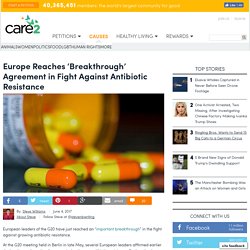
At the G20 meeting held in Berlin in late May, several European leaders affirmed earlier declarations advocating for concerted action on antibiotic resistance. Each nation has also agreed to draw up plans by the end of 2018 describing how they will individually and cooperatively tackle antibiotic resistance. While this gathering was not a full summit of the G20 countries — which include the United States, Mexico, Japan, India and several others — it served to convene European powers ahead of the official meeting in July. As such, the meeting served to establish an agenda, focusing the narrative on antibiotic resistance and what global powers can do to halt it. Antibiotic resistance is one of the biggest health emergencies facing the world today.
You-can-thank-antibiotics-for-all-the-cheap-meat. On demande Justice ! Cette vidéo montre comment des bactéries deviennent résistantes aux antibiotiques en quelques jours. Texte de la pétition: Prevent the Antibiotic Apocalypse - Ban Overuse in Farming! To Public Health England, the European Commission and Veterinary Medicines Directorate: We, the undersigned, agree that more urgent action is needed to prevent what could become an “antibiotic apocalyspe” if concerns over antibiotic resistance are not taken more seriously.
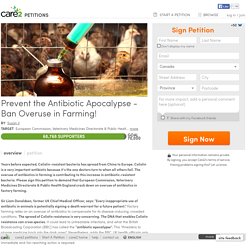
The Alliance to Save our Antibiotics notes that “In the UK, nearly 45% of all antibiotics are used in farming, mostly used as a pharmaceutical crutch to compensate for disease-inducing conditions of factory farming, where thousands of animals are typically kept crowded together in confined spaces.” Tell these fast food chains: Stop using meat raised with antibiotics. The gross overuse of non-therapeutic antibiotics in the production of animals raised for meat has given rise to such dangerous antibiotic-resistant superbugs that even last-resort treatments are now ineffective.
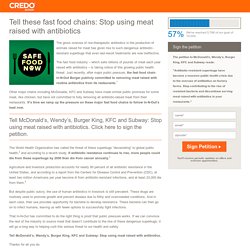
The fast food industry – which sells billions of pounds of meat each year raised with antibiotics – is taking notice of this growing public health threat. Just recently, after major public pressure, the fast food chain In-N-Out Burger publicly committed to removing meat raised with routine antibiotics from its restaurants.1 Other major chains including McDonalds, KFC and Subway have made similar public promises for some meat, like chicken, but have not committed to fully removing all antibiotic-raised meat from their restaurants.
It’s time we ramp up the pressure on these major fast food chains to follow In-N-Out’s lead now. Tell McDonald’s, Wendy’s, Burger King, KFC and Subway: Stop using meat raised with antibiotics. What you need to know about antibiotics in livestock. You’ve probably heard some controversy about antibiotics being used on farm animals – what’s the deal?
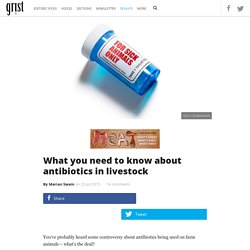
First, it’s important to clarify what we’re actually worried about. If you’re grossed out by the idea of antibiotics in your meat, don’t worry, that isn’t really the issue. Tell these fast food chains: Stop serving antibiotic-raised chicken. The use of human antibiotics in animals constitutes a public health hazard: It promotes antibiotic resistance, making these drugs much less effective at treating human diseases and saving lives.1 Now, according to a recent announcement, even McDonald’s plans to stop using chickens that have been treated with antibiotics that are used in humans.
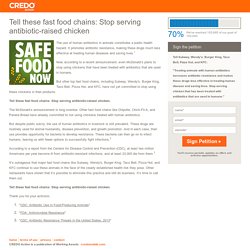
But other top fast food chains, including Subway, Wendy's, Burger King, Taco Bell, Pizza Hut, and KFC, have not yet committed to stop using these chickens in their products. McDonald’s stops buying chicken with antibiotics. Here’s why that matters. McDonald’s may be a global powerhouse, but right now it’s in a tough place.

It has lost its shine and, as I wrote last week, gleaming new upstarts are ascendant. One way that McDonald’s can begin to shake off its negative image is to lead on issues that cry out for reform. That’s what Steve Easterbrook did when he was in charge of McDonald’s in the United Kingdom, and that seems to be what he’s trying now that he’s become CEO of the entire corporation. Today McDonald’s took a step forward on one of those issues by announcing that its U.S. restaurants would only buy “chicken raised without antibiotics that are important to human medicine.”
Volailles : le test inquiétant de l'UFC-Que choisir. Losing the War on Super-Bugs. A post-antibiotic era—in which common infections and minor injuries can kill—far from being an apocalyptic fantasy, is instead a very real possibility for the 21st Century. – World Health Organization The super-bugs are gaining on us.
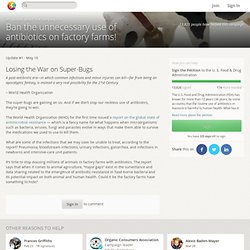
Sign the Petition to President Obama and USDA Secretary Vilsack · Get the USDA to Rescind Its 'Filthy Chicken Rule' Poultry is already the most deadly source of food borne illness. And working in a slaughterhouse is already the most dangerous job in America, according to some reports. So what is the U.S. Department of Agriculture's (USDA) plan to protect consumers and workers? It wants to privatize poultry inspection, putting companies in charge of their own inspections, and then increase the slaughtering line speed. Tell Obama to Keep Antibiotics Out of Your Food. Re: Docket No. FDA-2010-N-0155-0139 A copy of your letter of support will be delivered to President Obama and FDA Commissioner Margaret Hamburg: Dear President Obama and FDA Commissioner Hamburg, I was encouraged to learn that the Food and Drug Administration is taking steps through the proposed Veterinary Feed Directive, or VFD, rule to increase veterinary oversight when antibiotics are administered to livestock in feed and water.
And while I commend the agency for taking action, it’s time that the FDA preserve the efficacy of life-saving antibiotics by putting public health over the profits of the factory farm industry. Why Did FDA Ignore the Risks from Antibiotic Use? Overdose d’antibiotiques dans l’élevage industriel. FDA Ignored its Own Findings on the Dangers of Antibiotic Overuse on Farms. For decades scientists have been warning us about the link between the overuse of antibiotics on farms and the rise of antibiotic resistant bacteria, or superbugs, that are making people sick but nothing has been done. According to a new report from the National Resources Defense Council (NRDC), the Food and Drug Administration (FDA) itself concluded that using antibiotics on farms is unsafe years ago, but ignored its own findings. Antibiotics are routinely given to healthy animals on farms in a non-therapeutic manner, or before they actually get sick, to compensate for filthy living conditions and to promote growth.
The problem with this is that animals receiving low doses of antibiotics on a regular basis become walking reservoirs for bacterial growth that can result in antibiotic resistant strains of bacteria. Big Ag’s big lie: Factory farms, your health and the new politics of antibiotics. Every September, the Animal Health Institute, the trade group of the animal pharmaceutical industry, hosts a party on Capitol Hill called Celebrity Pet Night. The AHI describes its signature social event as a night for “members of Congress and their staff — as well as friends of the animal health community — to gather to celebrate America’s pets.” Held in the ornate Caucus Room of the Cannon House Office Building, the party receives high marks from D.C. society columnists for its classy setting, loaded double bar and zoological star power. Recent guests of honor include the cat Lord Tubbington from “Glee” and the French bulldog from the Robert Downey Jr. buddy-flick bomb “Due Date.”
As the AHI tells it, these animal celebrities “bring awareness to the connection between animal health and human health.” In this way the evening functions as an extension of AHI’s public relations campaign in defense of the factory farm system and the drugs it requires to function. Will Factory Farms Finally Have to (Gasp!) Get a Vet's Approval to Use Antibiotics? Almost 80 percent of antibiotics consumed in the United States go to livestock farms; antibiotic-resistant pathogens affecting people are on the rise; and the Centers for Disease Control and Prevention has made the connection between those two developments. So what's the Food and Drug Administration doing to curb overuse of these key drugs on animal farms? On Wednesday, the FDA spelled it out by releasing recommendations (text [PDF]; press release) on how drugmakers should "voluntarily" modify the way they administer antibiotics to the meat industry.
Cochon bonnet rouge. Imagining the Post-Antibiotics Future — Editor's Picks. Medical procedures may involve a high risk of infections, but our everyday lives are pretty risky too. One of the first people to receive penicillin experimentally was a British policeman, Albert Alexander. He was so riddled with infection that his scalp oozed pus and one eye had to be removed. The source of his illness: scratching his face on a rosebush. Sign the Petition · Keep Unnecessary Antibiotics Out of My Holiday Turkey!
Did you know that the majority of holiday turkeys destined for your table can't fly or walk because they were kept in tight spaces and continuously fed antibiotics to make them fat? Did you also know that your Butterball turkey could actually make you sick? Scientists have determined that the indiscriminate use of antibiotics in turkey feed is producing antibiotic-resistant bugs. And those bugs are turning up in turkey meat. Even scarier? It's getting harder to treat humans and animals for diseases because of over-exposure to antibiotics from eating meat and poultry. Fatter Turkeys, Fatter Profits, Sicker People. A petition to The Food and Drug Administration · Keep Unnecessary Antibiotics Out of My Butterball Turkey!
The FDA’s Guidance for Industry #213, ( asking drug makers to voluntarily change the labels on antibiotics used for livestock, and requiring farmers to get a prescription from veterinarians in order to buy antibiotics for farm animals falls far short of what is needed to protect consumers, the environment and the public health. The American Medical Association, the American Public Health Association, the National Association of County and City Health Officials, and the National Sustainable Agriculture Coalition are among the over 400 organizations ( representing health, consumer, agricultural, environmental, humane, and other interests that have supported enactment of legislation to phase out nontherapeutic use in farm animals of medically important antimicrobials. These organizations recognize the dangers posed by the overuse of antibiotics, such as including penicillin, azithromycin and tetracycline, that are critical to protecting humans from infection.
Sign the Petition to the U. S. Food & Drug Administration · Ban the unnecessary use of antibiotics on factory farms! Priorités Santé 2/5. La menace de l'antibiorésistance - Page 4. Antibiotics Don't Work Against Superbugs. Why Antibiotic Abuse is More Dangerous than We Thought. G8 - Clamp Down on Overuse of antibiotics in food production. Tell Obama to Keep Antibiotics Out of Your Food. Tell the FDA: We Need a Mandatory Ban on Sub-Therapeutic Doses of Antibiotics for Livestock—not Weak, Voluntary Guidance. Interdiction de nourrir aux antibiotiques les animaux d'élevage destinés à la consommation. Update: FDA Restricts Some Antibiotics in Livestock.